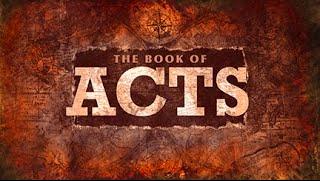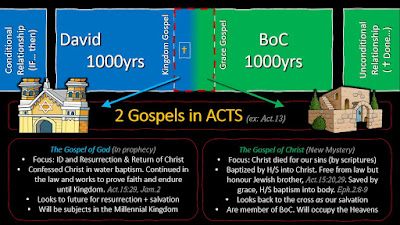OBS: ACTS - The Transition (Part 1 - The Bible is God's Words)
OBS: |  |
"ACTS, The Transition" is a Bible Study that we are studying via our Online Bible Study. This article is a basic study outline of the material we are covering, week by week. I am publishing these notes for attendees who want to study the scriptures and get a deeper understanding on what was discussed during the lessons. These notes will also be useful for attendees (and everyone else) who missed the lesson due to other circumstances.
Acts 1:1 The former treatise [account] have I made, O Theophilus, of all that Jesus began both to do and teach,
The Bible is God's Words
There is so much information contained in one small verse. The points I want to raise in this passage is (1) who was Theophilus? and (2) what was the former teatise [account] that Luke refers to.
Lets find out who Theophilus was.
Luke 1:3 It seemed good to me also, having had perfect understanding* of all things from the very first [beginning at John's birth], to write unto thee in order, most excellent Theophilus, 4 that you may know the certainty [be 100% sure] of those things in which you were instructed.
We cannot know for sure who Theophilus was, as the Bible does not clarify this, but have a look at the designation Luke uses for Theophilus. "Most excellent". This certainly tells us that Mr. Theo was an important figure in that time. Some of the most common theories are that Theophilus was possibly a Roman officer or high-ranking official in the Roman government, a wealthy relative of Caesar, a wealthy and influential "lord" in the city of Antioch, or even Paul's Roman lawyer. Paul used the same term, "most excellent", when addressing both governor Felix (Acts 23:26; Acts 24:2) and governor Festus (Acts 26:25). —So, we cannot know for sure, ...
... BUT —we can know what Luke's intentions for writing were. His stated reason for writing to Theophilus was "that you may have certainty concerning the things you have been taught" (Lk.1:3-4).
Luke wrote an historical account of the life, death, and resurrection of Jesus Christ and detailed the spread of Christianity throughout the Roman Empire. Luke's intention was to give Theophilus certainty that the "things he had been taught" were indeed true and trustworthy. If we reflect on this statement, we can surmise that Theophilus was interested in the Jewish religion, the life and teachings or Jesus and the spread of Christianity. Theophilus had already been instructed in these things, but Luke wrote his letters to bring clarity and certainly to Theophilus that the things he had learned were true.
There is one last statement that I am compelled to investigate in this lesson. Luke writes, "having had perfect understanding* of all things from the very first". What does Luke mean here? This is quite a statement! How could a human being have 'perfect' understanding? Did Luke REALLY mean that he understood all things from John (the Baptist) to the ascension of Christ perfectly and in 100% clarity?
Well, to answer this question, we have to go to the scriptures. Scripture must interpret scripture! Where can we find scripture that can substantiate Luke's claim?
* Perfect Understanding
John 14:26 But the Comforter, which is the Holy Ghost, whom the Father will send in my name, he shall teach you all things [make clear and plain the meaning of things], and bring all things to your remembrance [recall the exact details of], whatsoever I have said* unto you...
Here we have our answer. It was not Luke's superhuman mind that allowed him to recall and understand all that history. No! It was the power of the Holy Spirit in him at the time he penned the Gospel of Luke (in approx. 60AD) and ACTS (in approx. 62AD). The fact that Luke made this bold statement gives us insights into the life and times of those days. The Holy Spirit was working mightily in the apostles and they all have absolute clarity of ALL things that Christ taught them and were able to recall and remember ALL things that Jesus had said! That is incredible! In my books, a true miracle!
We need to learn and understand that scripture is not human wisdom or a compilation of man's thoughts. Inspiration of Scripture comes in "words", not merely in thoughts. The Holy Spirit did not give general thoughts to the human authors of Scripture and then let them put down whatever words they wanted. He guided them to use each and every word.
* John 17:8 For I have given to them the words which You have given Me; and they have received them, ...
1 John 2:27 ...but as the same anointing [Holy Spirit] teacheth you of all things,
I'd like to draw your attention to a beautiful piece of commentary written by Albert Barnes (1798-1870)
Commentary Statements:
Words are the expressions of thoughts; and if God designed that His truth should be accurately expressed in human language, there must have been a supervision over the "words" used, and that such [words] should be employed, and such [words] only, as should accurately express the sense which God intended to convey.
The revelation brought to men by Christ was a revelation of "words", not of thoughts or ideas. This consideration is of the most extensive importance in understanding the inspiration of the Scriptures. These words are not that which man's wisdom teaches —Not such as human philosophy or eloquence would dictate. They do not have their origin in the devices of human wisdom, and they are not expressed in such words of dazzling and attractive rhetoric as would be employed by those who pride themselves on the wisdom of this world. No. These were the "words" which the Holy Ghost taught —the words which the Holy Spirit imparted to them. The apostles were themselves under the direction of the Holy Spirit, imparting onto parchment the actual words of God conveyed to their understanding.
Was this true for the letters written by the Apostle Paul? ABSOLUTELY!!
Paul wrote by the inspiration of the Holy Spirit
Did Paul also have the same insights (and authority) when writing the Grace Doctrine as Luke and John and Matthew and Mark had?
Ephesians 3:1 For this cause I Paul, the prisoner of Jesus Christ for you Gentiles, 2 If ye have heard of the dispensation of the grace of God which is given me to you-ward: 3 How that by revelation he made known unto me the mystery; (as I wrote afore in few words, 4 Whereby, when ye read, ye may understand my knowledge [having being taught by the Spirit] in the mystery of Christ) 5 Which in other ages was not made known unto the sons of men, as it is now revealed unto his holy apostles and prophets by the Spirit;
1 Corinthians 14:37 If any man think himself to be a prophet, or spiritual, let him acknowledge that the things that I write unto you are the commandments of the Lord.
God's Words in Paul's Writings
1 Cor.2:12 Now we have received, not the spirit of the world, but the spirit which is of God; that we might know the things that are freely given to us of God. 13 Which things also we speak, not in the words which man's wisdom teacheth, but [in the words] which the Holy Ghost teacheth; comparing spiritual things with spiritual. (Inspired words, 2 Tim.3:16; 2 Pet.1:21)
1 Thess.2:13 For this cause also thank we God without ceasing, because, when ye received the word of God which ye heard of us, ye received it not as the word of men, but as it is in truth, the word of God, which effectually worketh also in you that believe.
In Conclusion
The Bible is an INCREDIBLE book! Each time we pick it up and read its pages we should know that we are reading the VERY WORDS OF GOD! It is not merely human thoughts and understanding, but the construct of God Himself, carefully placing every word in place, so as to convey His thoughts and desires, His instructions and warnings, His Fatherly advice and love to us.



Comments
Post a Comment